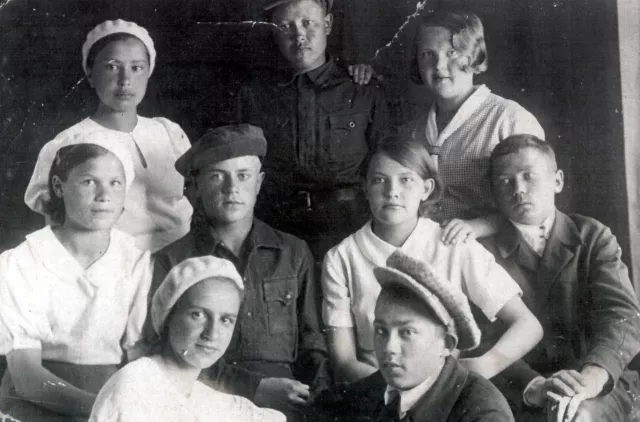Ninel Cherevko with schoolchildren
I, Ninel Shwartz, photographed with schoolchildren of secondary school in Alekminsk where my father was in exile. I am in the bottom row on the left. Photo made in 1938 on the occasion of finishing the 10th form.
In 1931 I went to a Russian secondary school. After work my mother and I went to walk my brother in the Arbat Street. I liked widow shopping. There was the first Torgsin store opened and during our walk in the evening we stared at exotic fruit: bananas and pineapples. We didn't buy anything at this Torgsin store - my mother was strict about the so-called 'luxuries' of life.
Our happy life ended in 1934 when on 1 December Kirov was murdered in Leningrad giving a start to the first wave of Stalin's repression. On 17 December my father didn't come home from work. My father was arrested at the accusation in the coalition of a counterrevolutionary group in Leningrad that was in opposition to the Party. On the next day after the search my mother was expelled from the Party and fired from work declared to be the wife of a traitor supporting her husband in his anti-Soviet activities. NKVD authorities ordered her to leave Moscow within 3 days or else she was subject to administrative deportation. I remember those horrific days when our mother was not like herself from grief preparing to leave. She told me that my father was innocent and that he was a devoted communist and that his arrest was a mistake of the Party. My mother didn't let me go to school to keep me away from abuse. However, my playmates in the yard called me a daughter of an enemy of the people. I burst into tears and my mother told me to stay at home. Many of my father's friends and colleagues were arrested and sent in exile.
My mother and I went to Simferopol to my mother's sister Zhenia. Shortly afterward my mother was ordered to come to the NKVD office where they told her that she was not allowed to reside in a capital city while Simferopol was the capital of the Crimean Autonomous Republic. So we had to leave for Evpatoria. We moved in with my mother's older sister Sophia Grigorenko. I went to school and the attitude towards me was watchful.
At the beginning of 1936 my mother submitted her request to obtain a permit to visit her husband and in summer this same year after I finished the 5th form my mother, my brother and I left for Alekminsk, located on the bank of the Lena River 600 km from Yakutsk up the river. The trip took us a month.
My father met us on the pier. It's hard to describe the excitement of our seeing each other: there were tears and laughter, questions and stories of our life. My father rented a room where we came, but later his Russian landlady Nastia gave us one more room. She didn't charge us for it. Nastia felt very sorry for my father and took to liking us a lot. I went to school in Alekminsk. There were other children whose fathers were in exile: Sergey Soloviov and Ania Babushkina - their fathers were devoted revolutionaries, and now they were forced to reside in Alekminsk. In 1937 another repression period began. My father lost his sleep and was very nervous - he listened to every sound in the street. In 1938 Soloviov and Babushkin were arrested and executed. Their children and wives vanished from the town. I guess their mothers shared a bitter destiny of wives of 'enemies of the people' and their children were assigned to children's homes. We were happy that our father was left alone. The children whose parents were in exile in Alekminsk were still under some suspicion at school. I became a pioneer in Moscow, but here in Alekminsk I submitted a request to the Komsomol, but I was not admitted. I went to the Komsomol regional committee in Yakutsk, 600 from Alekmisk where I had a discussion with Komsomol authorities. They asked me about my attitude towards the general policy of the Party and Komsomol. I thought that what happened to my father was a misunderstanding and believed sincerely in the communist ideals. I became a Komsomol member right there - at the Komsomol committee and obtained my Komsomol membership card and a badge.















